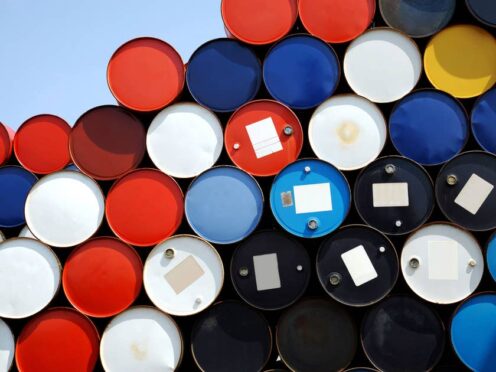
Russian oil is still ending up in the UK despite sanctions, a committee heard.
The import, acquisition, and supply of Russian oil and oil products into the UK was banned in December 2022.
G7 countries also agreed to cap the price of Russian oil and petroleum products, more generally, to reduce Vladimir Putin’s ability to finance his war in Ukraine.
Richard Bronze, head of geopolitics at Energy Aspects, a research company focused on global energy markets, gave evidence about the success of the sanctions to the Treasury Committee on Tuesday.
He was asked if, despite the sanctions, it was likely Russian oil was still ending up in the UK.
“Once it has been processed, or transformed by a refinery, yes,” he said.
He was asked to estimate how much.
“Probably not significant, these refineries, particularly in India, are a long distance from UK markets,” he said.
“So, just from an economic perspective, we import far more of our oil from European countries, far more from the US, so most of it will be going to other destinations.
“It will probably be well below 5% of our total imports, but there will be some.”
He added it would be “technically quite complex” to prevent it.
He said his organisation does not take policy positions, so he could not recommend anything.
“But in the question, are there refineries that are importing crude oil, processing it, and are those same refineries exporting to countries that are part of the price cap coalition – yes, it appears so,” he said.
However, he said it was “trickier” to say if the “molecules” of Russian oil remain the same after they have been refined.
“It is trickier to say are the molecules of Russian oil the same ones, once processed, that are loaded onto tankers and coming back in,” he said.
He added that if the molecules are refined or processed, then that flow is permitted under the rules as they have been set by the UK and other G7 countries.
Mr Bronze was also asked if the oil price cap was working.
“In a short answer, no,” he said.
“If we take the big picture, what are sanctions intended to do – deter or prevent Russia’s activities and invasion of Ukraine. They failed to deter, and they’re failing to stop or seriously hinder.
“That doesn’t mean they’re not having any impact at all.”
He said there had been a “significant impact” on “many parts of the Russian economy” due to the sanctions in total.
“I think even within the energy sector there is a substantial loss of revenue,” he said.
“Russian oil sells at much greater discounts than it did historically, Russia is selling less gas than it did by pipeline, and those are affecting Russian private sector and government revenues.
“But I think the amount of that we can attribute to the price cap, and the mechanism that was intended to drive those prices down, feels very limited.
“I think much more of that impact has come from the EU import ban, and from the ban on imports by the UK, the US, and by the western financial sanctions more broadly.”
He was asked if he would agree that the oil price cap was being breached “very frequently”.
“There is certainly indications of that,” he said.
“We just started over the turn of the year to see a bit of enforcement by the US authorities, a little bit, and very limited, enforcement by UK authorities.”
He said there was circumstantial evidence that a lot of oil was moving above the price cap – “particularly last year” – with potentially forged or misstated documents provided by the maritime serviced providers.
“But I think more significantly we’re seeing less and less of Russia’s oil exports relying on western vessels or western financial services,” he said.

Enjoy the convenience of having The Sunday Post delivered as a digital ePaper straight to your smartphone, tablet or computer.
Subscribe for only £5.49 a month and enjoy all the benefits of the printed paper as a digital replica.
Subscribe